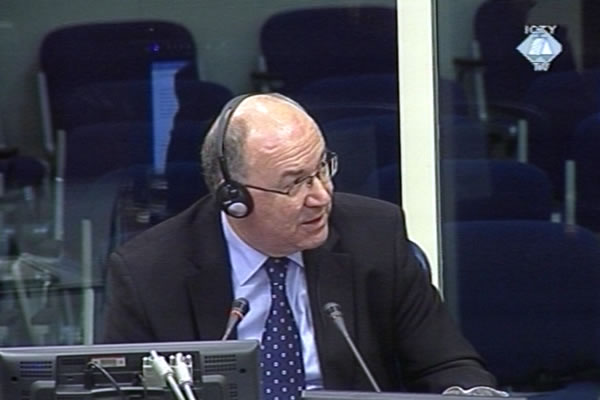Home
MATE GRANIC: ‘CROATIA DIDN’T DO ETHNIC CLEANSING’
While Granic didn’t deny that there were isolated crimes against Serbs and their property during and after Operation Storm, he claimed that the Croatian authorities wanted to defeat the enemy and to have the civilians remain in their homes. Why was a minority of Serbs allowed to return immediately while most of them had to wait two and a half years to come back
 Mate Granić, svjedok odbrane Mladena Markača
Mate Granić, svjedok odbrane Mladena Markača Immediately after Operation Storm, in August 1995, Croatia came under fire from the international community because of the murders of the Serbs who had remained in Krajina and the destruction of abandoned Serb property. Continuing his evidence in the defense of General Mladen Markac, Mate Granic, who served as Croatian foreign minister at that time, said that President Tudjman and the people around him were ‘deeply worried’ over that. At first they thought it was just a media campaign. However, by 20 or 25 August 1995 it was clear that there were widespread crimes and that they had to take radical measures to stop them.
Granic didn’t deny that there were individual crimes, maintaining that some elements in the international community unfairly accused Croatia of ethnic cleansing. In Granic’s view, it was a sort of conflict of great powers in which Germany and America supported Croatia while Great Britain harshly condemned Croatian actions after Operation Storm. Granic claims that the British were not pleased when their efforts, with Lord Owen’s mediation, to achieve a peaceful solution failed. Croatia then became a part of the US peace initiative and Operation Storm was launched as part of it. The aim of the Croatian offensive, and the US plan, Granic recounted, was not just to liberate Krajina but to advance into BH and weaken the Bosnian Serb military position. This was to force Bosnian Serbs to sit down at the negotiating table. The witness emphasized that at that time the Croatian authorities didn’t make ‘a single step’ without consulting the US administration.
Today Granic was adamant that there was no ethnic cleansing in Krajina. In Granic’s view, Serbs left because their evacuation was ‘planned, organized and encouraged’ by the RSK leadership. The aim of the Croatian authorities was to defeat the enemy, Granic said, and to have the civilian population remain in their homes. This is how Granic challenged the allegation in the indictment that there was a joint criminal enterprise headed by President Tudjman, with generals Gotovina, Cermak and Markac as participants.
In an effort to prove that the Croatian authorities were determined to make the Serbs stay in Krajina, defense counsel Goran Mikulicic showed minutes from the meeting of the Croatian government of 7 August 1995. At the meeting Granic and other ministers spoke of a need to urge the civilians to stay. Presiding judge Orie remarked that the Trial Chamber had heard a lot of evidence indicating that by 7 of August 1995, most of the Serbs had already left Krajina. ‘How are we to understand the call to Serbs to stay when they had already left’, Judge Orie asked the witness. A small number of Serbs had not left yet, Granic said, primarily those in Sector North; however, Sector North is not mentioned in the indictment against the Croatian generals.
In addition to its efforts to make Serbs stay in Krajina, Croatia did everything to make it possible for those who had fled to come back to their homes as soon as possible, Granic noted. In the beginning, however, a mass return was not possible for security reasons. On the other hand, individual requests for the so-called family reunion, the return of people whose family members remained in Croatia, were granted as soon as possible. In 1998, Croatian authorities and international humanitarian organizations drafted a plan for a large-scale return. The presiding judge then asked the witness if it meant that if a whole family fled, the family members had to wait up to two and a half years to come back because they didn’t have anybody to ‘reunite’ with. Granic confirmed that it was indeed the case.
Granic’s examination-in chief was completed today; in its course, defense counsel Mikulicic showed a number of transcripts from the government meetings, meetings with President Tudjman and the correspondence between Croatian and international officials. Most of the documents confirmed Granic’s claims. As the hearing today drew to a close, Gotovina’s defense counsel Luka Misetic began cross-examining the witness.
Linked Reports
- Case : Gotovina et al. - "Operation Storm"
- 2009-11-17 MATE GRANIC IN DEFENSE OF MARKAC
- 2009-11-11 CROATIA WAS DEFENDED FROM BH
- 2009-11-10 IVAN CERMAK’S DEFENSE RESTS ITS CASE
- 2009-11-19 SERBIAN COMPLAINTS AND INTERNATIONAL CRITICISM WERE ‘EXAGGERATED’
- 2009-11-20 TWO SIDES OF TUDJMAN’S PERSONALITY
- 2009-11-23 SERBS COULD RETURN THREE YEARS AFTER OPERATION STORM
